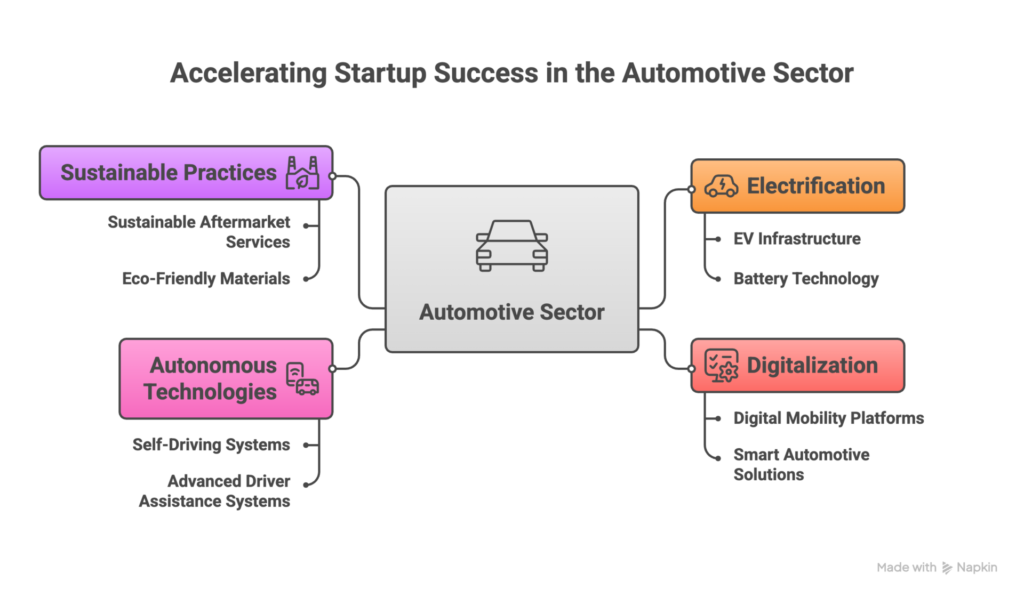Accelerating Your Startup: How New Entrepreneurs Can Thrive in the Automobile Sector in 2025
Introduction
The automobile industry has never been more dynamic or more accessible for aspiring entrepreneurs. As we venture deeper into 2025, the sector is experiencing a fundamental transformation driven by electrification, digitalization, autonomous technologies, and a growing emphasis on sustainable practices. For new entrepreneurs, this convergence of factors creates a unique window of opportunity to build scalable, profitable ventures that address real market needs.
Unlike previous decades when entering the automotive space required massive capital investments and deep industry connections, today’s landscape rewards innovation, agility, and digital-first thinking. Whether you’re interested in EV infrastructure, digital mobility platforms, smart automotive solutions, or sustainable aftermarket services, the pathways to success are clearer than ever before.
This comprehensive guide explores how new entrepreneurs can navigate the automotive sector, identify lucrative opportunities, and build thriving startups in 2025 and beyond.

Understanding the Modern Automobile Industry
The Shift from Traditional Models
The traditional automobile industry operated on a linear model: manufacturers produced vehicles, dealerships sold them, and service centers maintained them. Today, this model is fragmenting into multiple revenue streams and business opportunities.
Several macro-trends are reshaping the sector fundamentally. The global transition toward electric vehicles is accelerating rapidly. Major markets are setting ambitious targets for EV adoption, with some nations planning to ban internal combustion engine vehicles entirely by 2030-2035. This shift is not merely about swapping engines; it’s creating entirely new industries around battery technology, charging infrastructure, and EV-specific services.
Simultaneously, the rise of shared mobility and subscription-based ownership models is challenging the traditional “purchase and own” paradigm. Consumers, especially in urban areas and younger demographics, increasingly prefer flexibility and convenience over vehicle ownership. This preference opens doors for startups offering innovative rental solutions, car subscription services, and integrated mobility platforms.
The digital revolution has also fundamentally altered consumer expectations. Buyers now expect seamless online experiences—from virtual showrooms and augmented reality vehicle tours to AI-powered personalization and predictive maintenance alerts. Companies that fail to meet these expectations risk losing market share to tech-savvy competitors.
Emerging Technologies Creating Opportunities
Artificial Intelligence is revolutionizing every aspect of the automotive ecosystem. From predictive maintenance systems that alert drivers before issues arise to AI-powered customer service platforms that provide personalized recommendations, intelligent automation is becoming a competitive necessity.
Internet of Things (IoT) integration transforms vehicles into connected devices, generating valuable data that startups can harness for innovative services. Real-time diagnostics, fleet management analytics, and driver behavior insights are now accessible to startups through cloud platforms and APIs.
Blockchain technology offers new possibilities for vehicle ownership verification, supply chain transparency, and automated service transactions. Startups exploring blockchain applications in automotive registration, parts authentication, and warranty management are positioning themselves at the forefront of industry innovation.
Autonomous and semi-autonomous vehicle technologies continue advancing, creating opportunities not just in the technology itself but in supporting infrastructure, insurance solutions, and user experience design.
Identifying High-Potential Niches for New Entrepreneurs – Automobile
Electric Vehicle Infrastructure and Services
The EV revolution represents one of the most significant opportunities for automotive startups. While charging networks are expanding globally, significant gaps remain, particularly in emerging markets and rural areas. New entrepreneurs can establish regional charging networks, develop innovative charging solutions (such as portable rapid chargers or solar-powered charging stations), or create software platforms that optimize charging logistics and energy distribution.
Beyond infrastructure, EV-specific services represent untapped markets. Traditional service centers are only beginning to adapt to EV maintenance requirements. Startups can specialize in EV diagnostics, battery health monitoring, thermal management solutions, and specialized repair services. The aftermarket for EV customization and accessories is also in its infancy, offering significant opportunities for entrepreneurs with design and engineering capabilities.
Digital Mobility Platforms
The mobility-as-a-service (MaaS) sector continues to evolve, with opportunities extending far beyond ride-sharing. Urban micro-mobility solutions—electric scooters, bikes, and compact vehicles—are expanding into underserved markets. Entrepreneurs can develop platform-agnostic apps that integrate multiple mobility options, allowing consumers to plan seamless multi-modal journeys.
Car subscription platforms tailored to specific markets or demographics represent another high-potential niche. Unlike generic subscription services, entrepreneurs can create platforms targeting luxury enthusiasts, young professionals, business commuters, or corporate fleet management. The key is addressing specific pain points and offering superior convenience compared to traditional rental and ownership options.
Predictive Maintenance and Fleet Analytics
Fleet operators—from taxi companies to logistics providers—continuously seek ways to optimize vehicle maintenance and reduce downtime. Startups can develop AI-powered predictive maintenance systems that integrate with vehicles’ onboard diagnostic systems, analyzing real-time data to forecast maintenance needs before breakdowns occur. This service generates recurring revenue while providing significant cost savings to customers.
Fleet analytics platforms that track fuel efficiency, driver behavior, route optimization, and vehicle performance appeal to companies managing large vehicle fleets. By offering actionable insights and automated reporting, startups can command premium pricing while providing genuine value.
Sustainable and Green Automotive Solutions
The sustainability imperative creates opportunities across the automotive value chain. Startups can develop eco-friendly automotive products—from biodegradable cleaning solutions and sustainable interior materials to energy-efficient lighting systems. Others might focus on recycling and circular economy solutions, such as battery recycling, parts refurbishment, or automotive waste management.
Green financing solutions for EV purchases, carbon-neutral shipping services for automotive parts, or sustainability consulting for dealerships represent B2B opportunities for entrepreneurs with relevant expertise.
Autonomous Vehicle Support Services
As autonomous vehicles move from testing phases to commercial deployment, numerous supporting services will emerge. Startups can develop remote operation platforms for autonomous vehicles, create specialized insurance products, develop cybersecurity solutions for connected vehicles, or build user interface and experience layers for autonomous transportation services.
Automotive Data and Intelligence Services
Vehicle data has become a valuable commodity. Startups can aggregate and analyze automotive data to provide insights to manufacturers, dealers, insurers, and consumers. Platforms offering market intelligence, consumer preference analysis, competitive benchmarking, or predictive trend analysis can command significant valuations if built at scale.
Building Your Automotive Startup: A Comprehensive Roadmap – Automobile
Phase 1: Foundation and Validation
Begin by thoroughly understanding your target market. Conduct extensive market research to validate your assumptions about customer pain points, willingness to pay, and competitive dynamics. Interview potential customers, study competitors, and analyze market size and growth projections. This phase should take 2-3 months and cost relatively little.
Develop a detailed business model that articulates your value proposition, revenue streams, cost structure, and unit economics. For automotive startups, clarity on capital requirements, customer acquisition costs, and lifetime customer value is essential. Create financial projections based on realistic assumptions, not aspirational scenarios.
Phase 2: Product Development and MVP Launch
Develop a minimum viable product (MVP) that addresses your core value proposition without unnecessary features. For software-based startups, this might be a beta version of your platform with limited functionality. For hardware-focused ventures, this could involve partnerships with manufacturers to produce initial units.
Launch your MVP to a limited audience—early adopters who will provide candid feedback. This phase is about learning, not perfection. Gather qualitative and quantitative feedback, iterate rapidly, and don’t hesitate to pivot based on market signals.
Phase 3: Building Strategic Partnerships
In the automotive industry, partnerships are often more valuable than capital. Establish relationships with vehicle manufacturers, dealership networks, fleet operators, or complementary service providers. These partnerships provide credibility, customer access, and potential revenue opportunities.
Consider partnerships with technology platforms (integrations with vehicle systems, APIs, or data sharing agreements), financial institutions (for financing or insurance offerings), or industry associations (for standards compliance and market legitimacy).
Phase 4: Scaling Operations
Once you’ve validated product-market fit, focus on scalable operations. Implement cloud-based infrastructure that can expand without proportional cost increases. Automate repetitive tasks through software, outsourcing non-core functions, and building efficient internal processes.
For customer acquisition, develop multi-channel strategies combining digital marketing (content marketing, SEO, paid advertising), strategic partnerships, and direct sales efforts. In the automotive sector, relationship-based selling remains important, so balance digital and personal approaches.
Phase 5: Fundraising and Growth
As your startup demonstrates traction, pursue funding aligned with your growth stage. Seed funding might come from angel investors or accelerators, while Series A funding typically targets investors with automotive or tech sector expertise. Clearly communicate your market opportunity, competitive advantages, and path to profitability.
Use capital to accelerate customer acquisition, expand into new markets or product lines, and build the team infrastructure necessary for scale. However, maintain profitability discipline—the most successful startups balance growth with fiscal responsibility.
Digital Strategy for Automotive Startups
Building Your Digital Foundation – Automobile
An exceptional digital presence is non-negotiable in 2025. Your website should showcase your value proposition, provide clear calls-to-action, and offer seamless user experience across devices. Invest in professional design and ensure fast loading times, as performance directly impacts conversion rates.
Develop content marketing strategies that establish thought leadership. Create blog posts, whitepapers, videos, and infographics addressing your target audience’s challenges and interests. SEO optimization ensures your content reaches potential customers searching for solutions you provide.
Leveraging Social Media – Automobile
Different platforms serve different purposes. LinkedIn is ideal for B2B automotive businesses, corporate partnerships, and thought leadership. Instagram and TikTok showcase visual products and appeal to younger demographics. Facebook offers targeted advertising capabilities. YouTube is excellent for tutorials, product demonstrations, and educational content.
Consistency across platforms is crucial. Develop a content calendar, maintain brand voice, and engage authentically with your audience. Social proof—through customer testimonials, user-generated content, and industry recognition—builds credibility and drives conversions.
Embracing Emerging Platforms – Automobile
Consider emerging platforms relevant to your niche. For automotive technology, platforms like GitHub (for developer communities), Discord (for enthusiast communities), or specialized forums attract engaged audiences. Participate authentically in these communities, providing value before promoting your product.
Data-Driven Decision Making – Automobile
Implement analytics across all digital properties. Track website traffic, conversion rates, customer acquisition costs, and lifetime value. Use A/B testing to optimize key pages, email campaigns, and ad creative. Let data guide your marketing decisions rather than intuition alone.
Navigating Regulatory and Compliance Challenges – Automobile
Understanding Automotive Regulations
The automotive industry is heavily regulated, with requirements varying significantly by jurisdiction. Safety standards, emissions regulations, data privacy laws, and industry-specific certifications are mandatory considerations. Invest in legal and regulatory expertise early, as compliance oversights can be costly and damaging.
For startups developing vehicle-related products or services, understand relevant safety standards (ISO certifications, SAE standards, etc.). For data-related ventures, comply with data protection regulations (GDPR, CCPA, etc.), especially concerning vehicle and driver data.
Intellectual Property Considerations – Automobile
Protect your innovations through patents, trademarks, and trade secrets. In the automotive sector, intellectual property often provides significant competitive advantages. Work with patent attorneys to file appropriate applications, establish trademark protections, and maintain confidentiality agreements with team members and partners.
Building Sustainable Operations – Automobile
Increasingly, automotive stakeholders—customers, investors, and regulators—expect sustainability commitments. Build environmental responsibility into your business model from the start. Whether through carbon-neutral operations, sustainable sourcing, or environmental certifications, sustainability enhances brand reputation and future-proofs your business.
Financial Management and Profitability – Automobile
Unit Economics and Pricing Strategy
Understanding unit economics is critical for automotive startups. Calculate the cost per unit or per transaction, gross margins, and contribution margins. Ensure these metrics demonstrate pathway to profitability and competitive defensibility.
Pricing strategy should reflect value provided, not just costs incurred. Many automotive startups underprice, fearing competition. Instead, focus on communicating value and targeting customers who recognize that value. Premium positioning often attracts better-quality customers and supports team retention and growth.
Managing Cash Flow – Automobile
Automotive businesses often have long sales cycles and extended customer acquisition periods. Manage cash flow carefully by negotiating favorable payment terms, avoiding excessive inventory, and maintaining adequate working capital. Many promising startups have failed due to cash flow challenges despite demonstrating strong unit economics.
Metrics That Matter – Automobile
Track key performance indicators relevant to your business model. For SaaS offerings, monitor monthly recurring revenue (MRR), customer acquisition cost (CAC), lifetime value (LTV), and churn rate. For marketplace platforms, track active users, transaction volumes, and take rates. For hardware or physical services, focus on inventory turnover, service delivery efficiency, and customer satisfaction scores.
Building and Managing Your Team – Automobile
Recruiting Talent
In the competitive startup environment, attracting quality talent is challenging. Offer competitive compensation, meaningful equity, and the opportunity to work on innovative challenges. Emphasize your company’s mission and the potential impact of your work in the automotive industry transformation.
Consider a mix of automotive industry veterans (who bring domain expertise) and talented outsiders (who bring fresh perspectives). Diverse teams navigate challenges more effectively and generate more creative solutions.
Building Culture – Automobile
Culture becomes increasingly important as you scale. Define your values, reinforce them through hiring and promotion decisions, and maintain open communication. In the automotive sector, where technical expertise is valued, create environments that attract and retain talented engineers, data scientists, and product managers.
Continuous Learning – Automobile
The automotive industry evolves rapidly. Invest in continuous learning for your team through training programs, conference attendance, and knowledge-sharing sessions. Teams that maintain current industry knowledge adapt better to changes and innovate more effectively.
Case Studies: Successful Automotive Startups in 2025
Case Study 1: Regional EV Charging Network – Automobile
A startup in South Asia identified a gap in EV charging infrastructure and built a network of ultrafast charging stations integrated with renewable energy sources. By focusing on high-traffic corridors and offering a mobile app for real-time availability and payments, they achieved rapid expansion. Strategic partnerships with petroleum companies and vehicle manufacturers accelerated market penetration. Within two years, they expanded from one city to five major metropolitan areas.
Case Study 2: AI-Powered Fleet Management – Automobile
A technology startup developed predictive maintenance software for commercial fleet operators. By integrating with vehicles’ onboard diagnostics and using machine learning algorithms, they accurately forecast maintenance needs 2-3 weeks in advance. This capability reduced fleet downtime by 30% and maintenance costs by 25%. Their SaaS model provided recurring revenue, and strong unit economics enabled rapid scaling through strategic sales partnerships.
Case Study 3: Sustainable Automotive Accessories – Automobile
An e-commerce startup focused on eco-friendly automotive products—biodegradable car care products, sustainable interior materials, and efficient lighting solutions. By building a community of environmentally conscious car enthusiasts through social media and content marketing, they established strong brand loyalty. Direct-to-consumer sales through their website provided high margins, and strategic partnerships with eco-conscious dealerships expanded distribution channels.
Future Trends and Long-Term Opportunities – Automobile
Hyper-Personalization
As AI capabilities advance, personalization extends beyond recommendations to customized vehicle experiences—adaptive driving modes, personalized climate control, and individualized entertainment systems. Startups developing personalization engines or consumer preference analytics will capture significant value.
Integration of Autonomous Technology – Automobile
Even as fully autonomous vehicles remain in development, semi-autonomous features are proliferating. Startups can develop supporting services, insurance products, and user interface solutions for autonomous and semi-autonomous vehicles.
Circular Economy Innovation – Automobile
The sustainability imperative drives circular economy opportunities. Battery recycling, parts refurbishment, vehicle leasing over sales, and take-back programs represent growing opportunities for entrepreneurs aligned with environmental values.
Emerging Market Opportunities – Automobile
Developing nations represent significant growth opportunities as vehicle adoption increases. Startups that adapt solutions to local contexts—affordability, infrastructure realities, and regulatory environments—can capture large addressable markets.
Conclusion
The automobile industry in 2025 stands at an inflection point, presenting unprecedented opportunities for new entrepreneurs. Whether you’re building EV infrastructure, digital mobility platforms, intelligent vehicle services, or sustainable solutions, success requires combining deep market understanding with technological innovation and customer-centric thinking.
The path to thriving in the automotive sector demands thorough validation, strategic partnerships, disciplined financial management, and continuous adaptation. Entrepreneurs who embrace this mindset—validating assumptions, building systematically, maintaining financial discipline, and remaining adaptable—position themselves to build valuable, sustainable businesses that contribute to the automotive industry’s transformation.
The race is on. The entrepreneurs who move now, think differently, and execute excellently will shape the automotive landscape for years to come. Your opportunity to accelerate your startup in the automobile sector is here—seize it.






